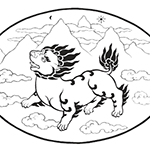| The following article is from the Winter, 1992 issue of the Snow Lion Newsletter and is for historical reference only. You can see this in context of the original newsletter here. |
In 1959 when the Tibetan people rose up against communist oppression, the revolt was ruthlessly crushed forcing many thousands of Tibetans to flee to India and elsewhere. In that year the Dalai Lama established an Institute of Higher Buddhist Studies at Buxadaur, West Bengal, India, for refugee monks. In Buxadaur the extreme heat and lack of pure water contributed to a high incidence of sickness and death. Through consultation between the Dalai Lama and the Indian Government, alternative sites for resettlement were arranged and in 1970 Sera Monastery was reestablished in Bylakuppe, South India. Initially 300 monks were resettled. In the next twenty years the population has grown to 200, swelled by new refugees from Tibet. Accommodations have not kept pace and there is overcrowding. Further, the new arrivals from Tibet are prone to contracting diseases which flourish in India's heat. Aware of this problem, the Dalai Lama donated funds to establish health care centers, including 50,000 Rs for Sera Jhe Monastery. In 1989 the abbot of Sera Jhe initiated discussions leading to the foundation of the Sera Jhe Health Care Committee to deal with the following issues:
1. The lack of adequate health care for the local monk and lay communities has prompted the establishment of the Health Care Dispensary. We hope to improve the facilities to the point where we can deal with emergencies and avoid deaths which have occurred in the past through lack of medical facilities and lack of transport to send patients to Mysore, 600 kilometers away. A doctor is present at the clinic each morning for one hour, 6 days a week. The clinic provides subsidized medicine to the monks and local Indian and Tibetan communities.
2. At present Sera Jhe Dispensary is housed in one room, which serves as examination room, clinic, dispensary and office in which 90 to 100 patients are attended to daily. In the future, we hope to build a small hospital appropriate to the needs of the community.
3. For serious emergencies that cannot be dealt with at Sera, patients must be sent to Mysore. We hope in time to purchase an ambulance for this purpose.
4. Some monks in the monastery, including the very young, lack a proper diet. The Dispensary provides them with extra food and nutritional supplements on a regular basis to improve their health.
5. To supplement the diet of the monks a small tofu factory has been set up, which produces soy bean curd and other soy products as well as peanut butter, etc.
6. To help fund these projects we plan to set up small businesses such as a restaurant and guest-house, and to sell tofu and associated products.
Any help offered can be directed to: Sera Jhe Health Care Committee, Sera Mahayana Buddhist University, P.O. Bylakuppe 571104 Distt Mysore, Karnataka State, India.

